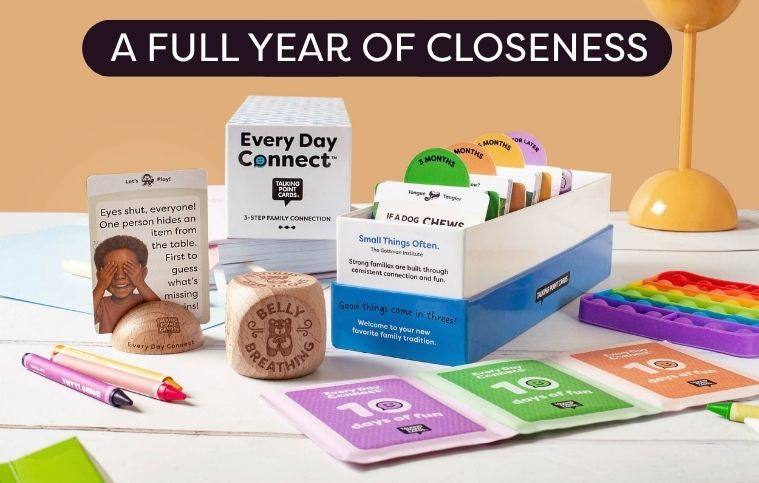SHOP
About
Is Alexa part of your family unit? She’s crept into ours, she’s very knowledgeable and has a great music collection. We’re happy she moved in. Some of the other tech stuff, we’re not sure about. Americans now check their phones on average 96 times a day – it feels like a lot doesn’t it? We’re plugged in and zoned out. Reading news, playing games, connecting with people around the world and ordering tasty meals from Uber eats. And our children are too, we give them devices to distract or reward them.
A recent study found that when a parent returned from work, only 30% were greeted by their children because they were so immersed in technology. 57% of parents are unhappy with the amount of time their kids are spending online.
Parenting is hard
When you have a child throwing a tantrum in the supermarket, fists pumping and lungs warbling, handing them a device can quieten them down. We all need five minutes peace, right? The problem becomes that that child never learns to soothe themselves or control their emotions. It can be a missed opportunity for a parent to make eye contact and connect.
And what about teenagers? Overuse of technology makes them feel lonely and more disconnected. The teen who throws a few grunts at their parents, then hides in their bedroom with the door shut chatting online to their friends may be feeling down. Up to 60% of teens in the US have experienced a major episode of depression according to the Department of Health and Human Services.
Keep the family unit strong
Missing out on family relationships because of technology means the family unit is not as strong as it could be. Children feel less comfort, trust, security and unfortunately less love from their parents. And there’s also poorer conversation, so parents don’t know what’s going on in their kids lives and have less ability to exert influence over them.
Communication is key
Researchers at Cornell University recommend that families eat a meal together at least three times a week to promote healthy communication. Children whose families engage in this important communication-enhancing ritual are more likely to enjoy the additional benefits of improved academic success and greater psychological well-being.
It’s important for parents to provide a safe space for their children to develop physically, intellectually, socially and emotionally. They can do this through play, reading books, making eye contact, talking, listening and learning how to read non-verbal cues.
Our Talking Point Cards are there to encourage families to turn away from their screens and talk again. They’re a fun way to get to know each other and reconnect. Families find they bond and laugh again, making everyone feel confident and secure that they are part of a precious unit.
Is Alexa part of your family unit? She’s crept into ours, she’s very knowledgeable and has a great music collection. We’re happy she moved in. Some of the other tech stuff, we’re not sure about. Americans now check their phones on average 96 times a day – it feels like a lot doesn’t it? We’re plugged in and zoned out. Reading news, playing games, connecting with people around the world and ordering tasty meals from Uber eats. And our children are too, we give them devices to distract or reward them.
A recent study found that when a parent returned from work, only 30% were greeted by their children because they were so immersed in technology. 57% of parents are unhappy with the amount of time their kids are spending online.
Parenting is hard
When you have a child throwing a tantrum in the supermarket, fists pumping and lungs warbling, handing them a device can quieten them down. We all need five minutes peace, right? The problem becomes that that child never learns to soothe themselves or control their emotions. It can be a missed opportunity for a parent to make eye contact and connect.
And what about teenagers? Overuse of technology makes them feel lonely and more disconnected. The teen who throws a few grunts at their parents, then hides in their bedroom with the door shut chatting online to their friends may be feeling down. Up to 60% of teens in the US have experienced a major episode of depression according to the Department of Health and Human Services.
Keep the family unit strong
Missing out on family relationships because of technology means the family unit is not as strong as it could be. Children feel less comfort, trust, security and unfortunately less love from their parents. And there’s also poorer conversation, so parents don’t know what’s going on in their kids lives and have less ability to exert influence over them.
Communication is key
Researchers at Cornell University recommend that families eat a meal together at least three times a week to promote healthy communication. Children whose families engage in this important communication-enhancing ritual are more likely to enjoy the additional benefits of improved academic success and greater psychological well-being.
It’s important for parents to provide a safe space for their children to develop physically, intellectually, socially and emotionally. They can do this through play, reading books, making eye contact, talking, listening and learning how to read non-verbal cues.
Our Talking Point Cards are there to encourage families to turn away from their screens and talk again. They’re a fun way to get to know each other and reconnect. Families find they bond and laugh again, making everyone feel confident and secure that they are part of a precious unit.
Is there anyone who hasn’t wished they could communicate better?
How much better would life be if you had a better relationship with your spouse? With your children? With your parents? With your friends?
The whole idea behind Talking Point Cards is to strengthen real relationships in a digital world. We hate that our time and attention is increasingly consumed by technology which is replacing real, genuine human relationships.
Your family connections and friendships shouldn’t suffer because TV, social media and online games are replacing our face-to-facetime! That’s why our founder, Ben, originally created Talking Point Cards.
Is there anyone who hasn’t wished they could communicate better?
How much better would life be if you had a better relationship with your spouse? With your children? With your parents? With your friends?
The whole idea behind Talking Point Cards is to strengthen real relationships in a digital world. We hate that our time and attention is increasingly consumed by technology which is replacing real, genuine human relationships.
Your family connections and friendships shouldn’t suffer because TV, social media and online games are replacing our face-to-facetime! That’s why our founder, Ben, originally created Talking Point Cards.
One Mission, A Thousand Voices
And we’re not alone. Our Talking Point Cards were so successful in growing intimacy, deepening trust, removing barriers and opening doors in relationships that people started noticing. We received stories from tens of thousands of customers about how these simple questions breathed new life into their marriages, families and lives!
From that feedback we noticed that communication was just one area which was suffering from the all-consuming impact of technology. So, we expanded our focus to include physical activity, screen-free entertainment, household management, self-care and mental health products - all to get people of all ages away from the screen and living their happiest, healthiest, most fulfilling life possible.
One Mission, A Thousand Voices
And we’re not alone. Our Talking Point Cards were so successful in growing intimacy, deepening trust, removing barriers and opening doors in relationships that people started noticing. We received stories from tens of thousands of customers about how these simple questions breathed new life into their marriages, families and lives!
From that feedback we noticed that communication was just one area which was suffering from the all-consuming impact of technology. So, we expanded our focus to include physical activity, screen-free entertainment, household management, self-care and mental health products - all to get people of all ages away from the screen and living their happiest, healthiest, most fulfilling life possible.
At Talking Point Cards, we say “live in real life.” Our products are designed to strengthen real relationships in a digital world.
At Talking Point Cards, we say “live in real life.” Our products are designed to strengthen real relationships in a digital world.
Our flagship conversation starters each have 200 professionally created questions targeted to a specific relationship, and come in an attractively durable box that fits in a bag or suitcase.
The Talking Point Cards come in a variety of purpose-designed sets. Some of our best sellers: Couples Edition, to enhance and deepen the relationship with your spouse or partner. Family Edition, to get everyone talking comfortably and openly no matter their age. Generations Edition, to help learn your parent’s (or grandparent’s) life stories. Christian Edition, to help you begin real, comfortable discussions about your faith.
Our flagship conversation starters each have 200 professionally created questions targeted to a specific relationship, and come in an attractively durable box that fits in a bag or suitcase.
The Talking Point Cards come in a variety of purpose-designed sets. Some of our best sellers: Couples Edition, to enhance and deepen the relationship with your spouse or partner. Family Edition, to get everyone talking comfortably and openly no matter their age. Generations Edition, to help learn your parent’s (or grandparent’s) life stories. Christian Edition, to help you begin real, comfortable discussions about your faith.
Couples Edition
Thought-provoking conversation starters for couples to enhance and deepen your relationship.
Family Edition
Engaging conversation starters for families to enhance and deepen your relationship.
Christian Edition
Begin real discussion about Christian faith with guided conversation starters.

Couples Edition
Thought-provoking conversation starters for couples to enhance and deepen your relationship.
BEST FOR: Couples, Married, Dating

Family Edition
Engaging conversation starters for families to enhance and deepen your relationship.
BEST FOR: Families, Parents, Relatives

Christian Edition
Begin real discussion about Christian faith with guided conversation starters.
BEST FOR: Churches, Small Groups, Youth
Get new videos, discount codes, and more!
Our Story
Talking Point Cards started in 2015 when founder Ben Jones asked the question: “What is happening to our relationships?”
It seemed that our time was increasingly consumed by technology which had replaced real, genuine human relationships.
His solution to this problem was to reclaim family time from TV, Social Media & Online Games with resources so engaging& useful that everyone would want to unplug to enjoy some quality time& real conversation with friends & family. This is where the idea for Talking Point Cards was born.
The Real-Life Revolution
As Talking Point Cards grew, we noticed that communication was just one area which was suffering from the all-consuming impact of technology.
In response to our customer feedback, we expanded our focus to include physical activity, screen-free entertainment, household management, self-care and mental health products - all to get people of all ages away from the screen and living their happiest, healthiest, most fulfilling life possible.
Our goal is to build a Real-Life Revolution; a worldwide community to offer positive support and products about promoting real relationships and healthy lifestyles in a digital world! This mission pervades everything we do.
Talking Point Cards started in 2015 when founder Ben Jones asked the question: “What is happening to our relationships?”
It seemed that our time was increasingly consumed by technology which had replaced real, genuine human relationships.
His solution to this problem was to reclaim family time from TV, Social Media & Online Games with resources so engaging& useful that everyone would want to unplug to enjoy some quality time& real conversation with friends & family. This is where the idea for Talking Point Cards was born.
The Real-Life Revolution
As Talking Point Cards grew, we noticed that communication was just one area which was suffering from the all-consuming impact of technology.
In response to our customer feedback, we expanded our focus to include physical activity, screen-free entertainment, household management, self-care and mental health products - all to get people of all ages away from the screen and living their happiest, healthiest, most fulfilling life possible.
Our goal is to build a Real-Life Revolution; a worldwide community to offer positive support and products about promoting real relationships and healthy lifestyles in a digital world! This mission pervades everything we do.












